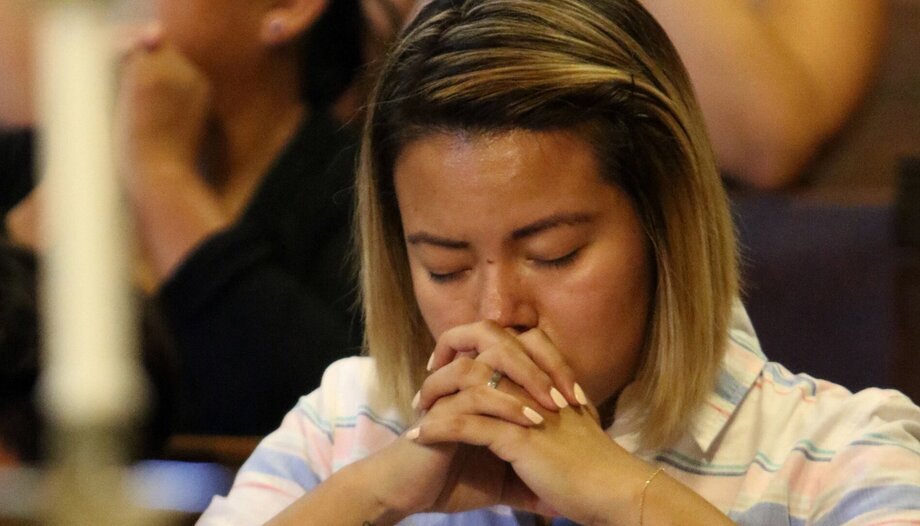Although the Catholic faith is the faith professed by the majority of Hispanics in the United States, it is also the faith that loses more Latinos than any other religious group, with a growing number of Hispanics reporting no religious affiliation. These are some of the most relevant findings from the survey. Pew Research Center published on April 13.
In 2010, 67 % of Hispanics in the United States claimed to be Catholic. This figure fell sharply to 43 % in 2022, but was already at 49 % in 2018. Nearly one in four Hispanics are former Catholics. Of the 65 % of Hispanics who claim to have been raised Catholic, 23 % acknowledge that they no longer identify with that religion. Some have joined another faith, mainly Protestant, while the majority no longer belong to any church.
Protestants are the second largest religious group for Hispanics, with 21 %. Among Hispanics residing in the United States, 39 % say religion is "very important". Among evangelical Hispanics, 73 % say the same, and 46 % of Catholic Hispanics feel the same way. Among U.S. Hispanic Catholics, 22 % go to church weekly or more often. Only 1 % of those who say they have no religious affiliation do the same.
Hispanics who identify themselves as atheist, agnostic or "nothing in particular" rank at 30 %, in contrast to 10 % who belonged to this category in 2010 and 18 % in 2013. It should be noted that 29 % of Hispanics who practice no faith still pray at least once a week. Nearly a quarter of all U.S. Hispanics are former Catholics.
The abandonment of Catholicism is more pronounced among young people between 18 and 29 years of age. In this population group, 49 % say they have no religious affiliation. In the 50-64 and 65 and over age groups, it is less common to identify themselves in this category, with 20 % and 18%, respectively. Even so, these figures are significant.
Among Hispanics born outside the United States and living here, 52 % belong to the Catholic Church, and 21 % say they have no religious affiliation. In contrast, 36 % of U.S.-born Hispanics profess the Catholic faith and 39 % have no religious affiliation. Language also plays a role: 56 % of Spanish speakers identify themselves as Catholic, in contrast to 32 % of English speakers. This figure stands at 42 % among bilingual respondents.
The decline in the number of Hispanics professing the Catholic faith - especially, but not exclusively, among the young - should be of concern to Church leaders. It compels them to devise innovative forms of evangelization that take into account what is most important in people's lives, and for many of them that is material success. Hispanics attending Mass and living a Catholic life should no longer be taken for granted.
A crisis, a time for change
It seems more than evident that the American way of life, based on entertainment and the accumulation of money and material goods, makes Hispanics oblivious to their Catholic roots and values. It leaves them empty in crucial aspects of their lives. Many people work two or three jobs to try to get ahead, leaving aside reflection and spirituality.
There is a serious setback in the valuation of the faith that delineated and gave sustenance to Latin American cultures. For centuries, the Church has played a central role in Latin American countries and their cultures, so that Catholicism is also a foundational foundation in the formation of human beings.
Church leaders face the inescapable task of presenting Catholicism in a more dynamic and attractive way, capable of bringing home the historical and contemporary relevance of the faith. Somehow, the Church must convincingly address and challenge the hegemonic culture to present a viable alternative in a culture sustained by materialism and ambition in order to succeed in that arena. The Church can emulate evangelical practice and its commitment to go in search of people rather than sitting back and waiting for people to come to church.
There is also a political and ideological battle to be waged. According to the Pew survey, former Catholics pointed to the lack of LGBTQ inclusion, sexual abuse scandals and the impediment to women being ordained as some of the key factors that led them to leave their Church. In this regard, the Church must also demonstrate a high degree of sensitivity and sophistication to defend its teachings in a convincing manner.
Without a concerted and creative effort by the Church to address these and other deficiencies, the loss of Hispanic Catholics will continue unabated, further undermining the faith that truly touches the heart of the Hispanic community.









